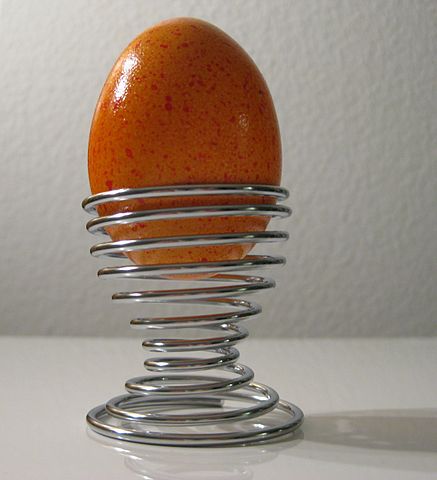Inedible Eggs

Hard boil an egg, let it cool, and crack the shell. If you did that about a decade ago, it probably peeled easily, breaking into a few large pieces — or, at least, that’s how you probably remember it. But now? The eggs seem impossible to peel, shattering into a billion pieces each stuck to the egg itself, as if bound to it by the Force or with super glue.
It may not just be your memory. There may be a scientific explanation for why hard boiled eggs are recently hard to peel. It’s because, the theory goes, the eggs are fresh.
As explained by the U.S. Department of Agriculture (via this 2009 article in Wired), the egg itself contracts over time as gas escapes it and enters the air cell within the egg shell. If you hard boil an egg early in this process, the air space between its inner and outer membranes (that is, the skin-like film on the egg white and the inside of the shell, itself) stick together. And the shell therefore is harder to separate than it would be had the egg been older.
You need not be purchasing direct from the farm, either. Efficiencies in factory farming have allowed the retail agriculture industry to get fresher eggs — relative to say, fifteen years ago — in stores across the country. The above-cited Wired article notes that a 1998 USDA study concluded that an expected — and, it turns out, correctly predicted — move to larger scale egg production facilities would halve the amount of time it takes for eggs to get from farm to store, with a total reduction of about two days saved.
While one expert interviewed by Wired suggests mixing sodium bicarbonate into your egg-boiling water, he cautions that doing so will not only weaken the shell’s adhesion, it will also strengthen the taste of sulphur in the eggs. Your best bet may be waiting until the eggs are closer to the expiration date if you want to hard boil them.
Bonus fact: The same principle above — the idea that older eggs have a larger air space — also can be used to determine the age of an uncooked, raw egg (still in its shell). If you put such an egg in a bowl of water on its long side, how it sinks — if at all — will tell you roughly how old it is. If it sinks straight to the bottom, according to About.com, it’s less than a week old. If it sinks and tilts, it’s probably a week or so old, but if it sinks and stands on its end, it’s at about two weeks. If the egg floats, it is probably three weeks old — and, likely, no longer good to eat.
From the Archives: Contraband Confection: You can open this egg pretty easily — you just can’t bring it into the United States.
Related: The Eggstractor — a $20 device which claims to flawlessly peel hard boiled eggs, but, given the reviews, does anything but. One reviewer sums it up well, calling it “something one might expect to see on a game show where the contestant must process so many eggs in a specified time in order to win the prize or advance to the next level. But as a useful kitchen tool, it’s a joke.”

Leave a comment